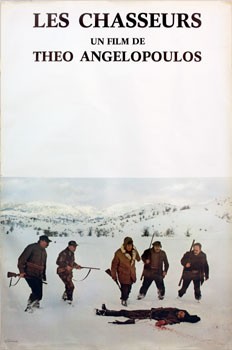Films A-Z
Theo Angelopoulos, Greece
Theo Angelopoulos - A Traveller in Time
There is one of these fundamental question in life, that can appear every now and then, it’s the question: What was first, the chicken or the egg? I was thinking of this question when I asked myself, what was first for the filmmaking of Theo Angelopoulos: The History, the one with with a big H, or the cinematographic language? Did he love to make “plan sequences” as a cinematographic approach to life (and did he continue because the teachers at IDHEC in P…

 Anaparastasi
Anaparastasi
Theo Angelopoulos
Greece, 1970
Greece
1970
100 min.
DVD, DCP
CH, DE, AT
Griechisch/d/f
The film is based on an actual event, the murder of a Greek worker living in Germany by his barmaid ...
More

 Athina, epistrofi stin Akropoli - Athen
Athina, epistrofi stin Akropoli - Athen
Theo Angelopoulos
Greece, 1983
Greece
1983
43 min.
DVD
CH, DE, AT
Griechisch
Angelopoulos was born and grew up in Athens. The Athens that starts from the Acropolis and extends ...
More

 Eleni
Eleni
Theo Angelopoulos
Greece, 2004
Greece
2004
169 min.
35mm
CH, DE, AT
Griechisch/d/f
The film is set entirely in Greece between 1919 and 1949. It begins with the entry of the Red Army ...
More

 I kynighi - The Hunters
I kynighi - The Hunters
Theo Angelopoulos
Greece, 1977
Greece
1977
144 min.
DVD, Blu-ray
CH, DE, AT
Griechisch/d/f
It is New Year's Eve. 1976. On a Greek island a party of bourgeois hunters comes upon a body, buried ...
More

 L'éternité et un jour - Mia aioniotita kai mia mera
L'éternité et un jour - Mia aioniotita kai mia mera
Theo Angelopoulos
Greece, 1998
Greece
1998
132 min.
35mm, DVD, Blu-ray, DCP
CH, DE, AT
Griechisch, Englisch, Italienisch/d/f
Eternity And A Day traces the final days of Alexandre (Bruno Ganz), a celebrated Greek writer as he ...
More

 Meres tou 36
Meres tou 36
Theo Angelopoulos
Greece, 1973
Greece
1973
105 min.
DVD
CH, DE, AT
Griechisch/d/f
A trade unionist is assassinated at a workers' rally and a former police informer, Sofianos, is ...
More

 O Megalexandros
O Megalexandros
Theo Angelopoulos
Greece, 1980
Greece
1980
210 min.
DVD, Blu-ray
CH, DE, AT
Griechisch/d/f
The film is a study of the 20th century cult of personality - the myth, the lure and the corruption ...
More

 O melissokomos - The Beekeeper
O melissokomos - The Beekeeper
Theo Angelopoulos
Greece, 1986
Greece
1986
122 min.
35mm, DVD, DCP
CH, DE, AT
Griechisch/d/f
In THE BEEKEEPER, alienation and despair have so mestastasized in the film's central figure that ...
More

 O Thiasos - The Travelling Players
O Thiasos - The Travelling Players
Theo Angelopoulos
Greece, 1975
Greece
1975
230 min.
35mm, DVD, Blu-ray
CH, DE, AT
Griechisch/d/f
THE TRAVELLING PLAYERS is a film of epic proportions. The action takes place during the years ...
More

 Taxidi sta Kythira - Voyage to Cythera
Taxidi sta Kythira - Voyage to Cythera
Theo Angelopoulos
Greece, 1984
Greece
1984
135 min.
DVD, Blu-ray, DCP
CH, DE, AT
Griechisch
Cythera, in Greek mythology, is the isle of dreams where one can dedicate oneself to happiness (or ...
More

 The Suspended Step of the Stork
The Suspended Step of the Stork
Theo Angelopoulos
Greece, 1991
Greece
1991
143 min.
35mm, DVD
CH
Griechisch/d/f
While working on a story in the border area, a young journalist discovers a divided town bisected by ...
More

 Topio stin omichli
Topio stin omichli
Theo Angelopoulos
Greece, 1988
Greece
1988
124 min.
35mm, DVD
CH, DE, AT
Griechisch/d/f
LANDSCAPE IN THE MIST is a film about the void. It is a film about despair, about the failure of ...
More